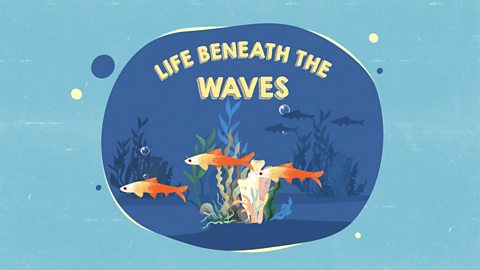Naomi Wilkinson and some young helpers explore the problem that plastic waste poses for oceans and marine wildlife.
NAOMI: Hi, everyone. What are you up to today?
CHILD: We're litter-picking.
NAOMI: Great! You've done a good job there. What have you found?
CHILD: I found this piece of a plastic bottle.
CHILD: I found this plastic container.
NAOMI: That's a lot of plastic on the beach!
We use plastic in many different ways. To wrap our food and drinks. To make toys. To make bags for carrying shopping. There's even plastic where you'd never expect to find it, like in some clothes. So how does plastic end up in the ocean?
There are many ways that plastic gets into our oceans and seas. One way is litter. When plastic rubbish drops on the ground, it can end up in our drains. Drains eventually lead to the oceans.
Another way is through our toilets! Sometimes things with plastic in them, like wet wipes and dental floss, get flushed down our toilets and because they're small, they pass through the grates that are used to catch rubbish and end up in the ocean.
There's so much plastic in our oceans that it's washing up on beaches, even in places where there are no people, like here at an island in the Pacific Ocean called Henderson Island. Thousands of bits of rubbish wash up here every day.
Some of the plastic will sink under the waves where sea creatures can mistake it for food. If a sea creature eats some of the plastic, it might get stuck in its throat, or end up in its stomach making it feel unwell.
The plastic also breaks down into smaller and smaller parts which get eaten by small fish. Those small fish get eaten by bigger fish which can get eaten by people. So the plastic problem affects us all.
Let's check in with our Nature Explorers.
ALEESHA: Hello, everybody! Today I'm out for a litter-pick with my mummy. Let's go!
For a litter-pick you need four things. A litter-picker, gloves, a bin bag and a high vis jacket. Let's go!
There's a tissue here. Got it, in it goes.
This litter is so bad for the environment. Hopefully you've learnt something more about litter, bye!
NAOMI: Thanks, Aleesha!
What have you found?
CHILD: We found these ropes.
CHILD: We think they might be dangerous for the animals.
NAOMI: You're absolutely right: wildlife can get caught in nets and ropes and this can cause them a lot of problems.
Around the world people are trying to solve the problem of plastics in our oceans. One way that everyone can help is through organised litter-picks at local beaches. Another way is through machines, like this one, that clean up plastic floating in our oceans and bring it back to land to be recycled. Scientists are also working on making a bacteria that could eat plastic.
Our oceans are vast and beautiful and home to lots of different creatures. Around the world people are doing what they can to solve the plastic problem and we can do our bit too! Reduce the amount of plastic we use. Reuse any plastic that we can. And recycle the plastic once we're are finished with it.
The plastic problem
This resource explores plastic waste and the problem it is causing the oceans. The film joins a group of children taking part in a litter-pick on their local beach and reveals just how much plastic waste can be found in our local areas.
The film explores how plastic waste can find its way into the oceans - through being washed down drains and also through toilets. In the ocean the plastic breaks down into smaller and smaller parts, which can be eaten by fish and thus enter the food chain. So it is a problem not just for marine animals but also for humans.
Points for discussion:
- What is a plastic?
- How can plastics end up in our rivers and seas?
- How do plastics affect food chains?
- How can plastic waste end up in places that humans do not live, like Henderson Island?
- How can you help to reduce the amount of plastic that ends up in our rivers, seas and oceans?
- What exciting things have scientists found or invented to help solve the plastic problem?
Suggested activities:
Following exploring the plastic problem in more detail, pupils could undertake a local litter-pick. Ensure appropriate clothing and equipment is used to keep everyone safe. Pupils could explore the varying types of litter collected, and then find out which could be recycled and how they could group the litter collected.
Pupils could work to write a letter to a local Member of Parliament or local business to ask for their support in reducing plastic waste and increasing opportunities to recycle. They could use any knowledge gained from the video, or their own research, to support their writing.
Over the course of a week, pupils could keep a diary showing every time they use plastic as part of their daily lives. Once the information has been collected, consider as a class what changes could be made to use less plastic. What could the plastic items used be replaced with?
Pupils could plan and carry out a science investigation to explore how long different materials take to decompose. Consider things such as paper, plants, plastic. Monitor over a period of time how quickly each decomposes and use the results to illustrate the impact of the plastic problem on the wider sustainability of the Earth.
This film is relevant for teaching Science and Geography within the National Curriculum in England and Northern Ireland at KS1, 1st Level in Scotland and the Science and Technology and Humanities Areas of Learning and Experience within the Curriculum for Wales.
Further resources
Click to display image full size
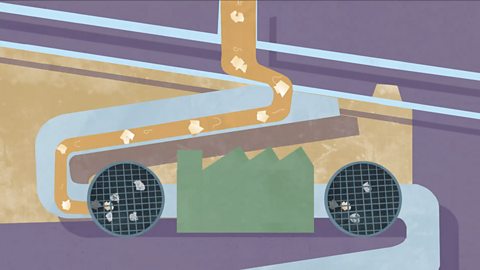
Click to display image full size
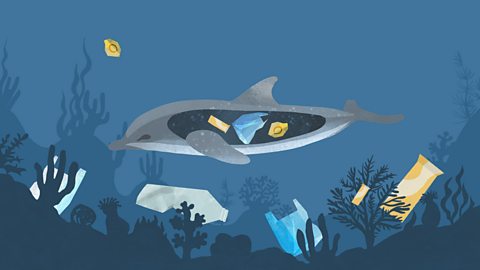
Click to display image full size
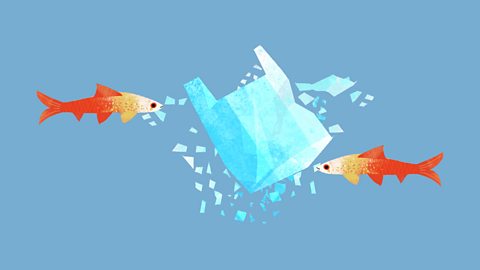
The oceans of the world. video
Identifying and exploring the five oceans of the world.
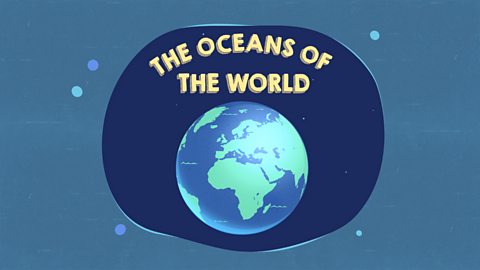
Life beneath the waves. video
Exploring the characteristics of fish and some examples of wonderful marine life.
